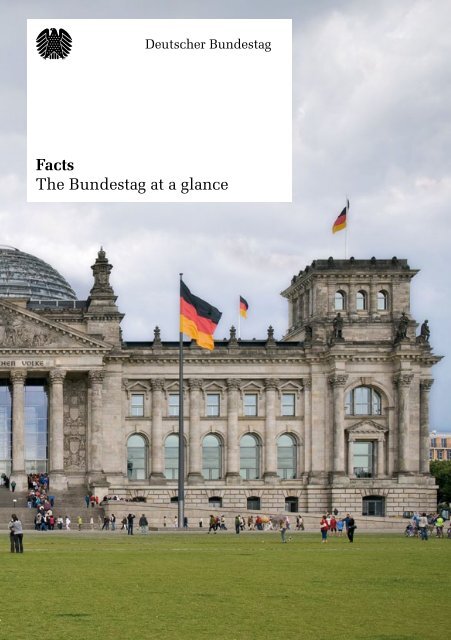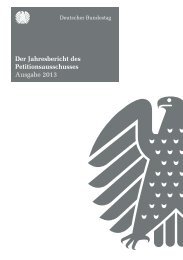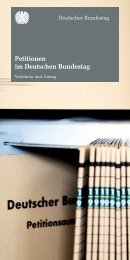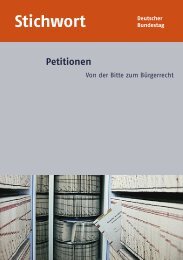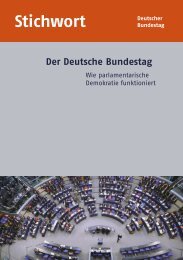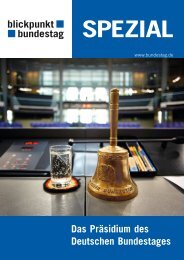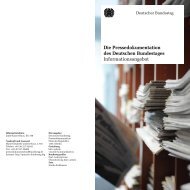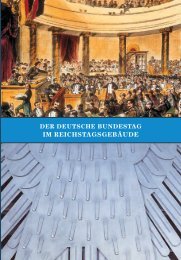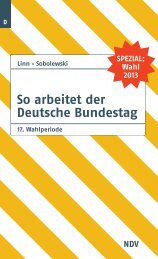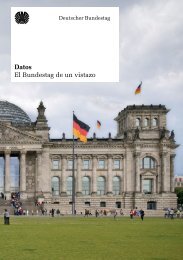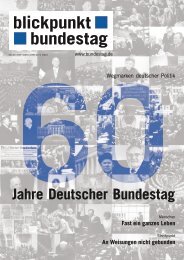Facts - The Bundestag at a glance - Deutscher Bundestag
Facts - The Bundestag at a glance - Deutscher Bundestag
Facts - The Bundestag at a glance - Deutscher Bundestag
Create successful ePaper yourself
Turn your PDF publications into a flip-book with our unique Google optimized e-Paper software.
<strong>Facts</strong><br />
<strong>The</strong> <strong>Bundestag</strong> <strong>at</strong> a <strong>glance</strong>
Contents<br />
2 Tasks of the <strong>Bundestag</strong><br />
4 German <strong>Bundestag</strong> –<br />
17th electoral term<br />
6 <strong>The</strong> <strong>Bundestag</strong> makes the laws<br />
10 <strong>The</strong> <strong>Bundestag</strong> elects the Chancellor<br />
12 <strong>The</strong> <strong>Bundestag</strong> scrutinises the<br />
Government<br />
16 Members of Parliament –<br />
envoys of the people<br />
24 Main organs and bodies of the <strong>Bundestag</strong><br />
32 Parliamentary elections<br />
36 <strong>Bundestag</strong> buildings<br />
38 <strong>The</strong> Reichstag Building<br />
44 <strong>The</strong> Paul Löbe Building<br />
48 <strong>The</strong> Marie-Elisabeth Lüders Building<br />
50 <strong>The</strong> Jakob Kaiser Building<br />
52 More about the <strong>Bundestag</strong>
Tasks of the <strong>Bundestag</strong><br />
<strong>The</strong> German <strong>Bundestag</strong> is the supreme<br />
constitutional organ of the Federal<br />
Republic of Germany and the only organ<br />
of the st<strong>at</strong>e th<strong>at</strong> is directly elected by<br />
the people. As the Basic Law puts it,<br />
“All st<strong>at</strong>e authority is derived from the<br />
people”. And the people – the sovereign<br />
body – lend their power to Parliament<br />
for a limited time only. Every four years,<br />
the voters go to the polls in parliamentary<br />
elections to determine who will represent<br />
their interests in the <strong>Bundestag</strong>.<br />
St<strong>at</strong>e authority is exercised in Germany<br />
by the classical triad of legisl<strong>at</strong>ure,<br />
judiciary and executive, each of which<br />
checks and balances the others. In the<br />
interplay of these three branches, the<br />
legisl<strong>at</strong>ive role devolves on the <strong>Bundestag</strong>.<br />
Only it can enact federal laws<br />
th<strong>at</strong> are binding on all people in Germany.<br />
This places gre<strong>at</strong> responsibility in<br />
the hands of Parliament, which guides<br />
the n<strong>at</strong>ion’s political and social<br />
development.<br />
<strong>The</strong> <strong>Bundestag</strong>, however, does not only<br />
make laws. It also elects the Federal<br />
Chancellor, who is head of the executive,
th<strong>at</strong> is to say of the Federal Government.<br />
<strong>The</strong> Head of Government is thus<br />
directly determined by Parliament. This<br />
shows how closely the constitutional organs<br />
are linked in the system of checks<br />
and balances, in spite of the separ<strong>at</strong>ion<br />
of powers. <strong>The</strong> votes of the Members<br />
of Parliament also weigh heavily in the<br />
election of the Federal President, as<br />
the Federal Convention, which elects<br />
the Head of St<strong>at</strong>e, comprises all the<br />
Members of the <strong>Bundestag</strong> and an equal<br />
number of represent<strong>at</strong>ives of the federal<br />
st<strong>at</strong>es (Länder). In addition, the <strong>Bundestag</strong><br />
is also involved in appointments<br />
to other high offices. For example, it<br />
elects half of the judges of the Federal<br />
Constitutional Court, the President and<br />
Vice-President of the Federal Audit Office<br />
and the Federal Commissioner for<br />
D<strong>at</strong>a Protection and Freedom of Inform<strong>at</strong>ion.<br />
<strong>The</strong> <strong>Bundestag</strong> exercises an important<br />
power of scrutiny over the Government.<br />
No Chancellor or government minister<br />
can escape this scrutiny. In votes<br />
on government projects, the Federal<br />
Chancellor depends on the confidence<br />
of Parliament. If a government cannot<br />
convince the Members of the <strong>Bundestag</strong>,<br />
it cannot pursue its political aims.<br />
In order to perform this scrutinising<br />
function, Members of Parliament must<br />
be able to inform themselves about the<br />
work of the Government and its plans.<br />
To this end they have a number of<br />
rights and instruments <strong>at</strong> their disposal,<br />
such as major and minor parliamentary<br />
questions and deb<strong>at</strong>es on m<strong>at</strong>ters of<br />
topical interest. <strong>The</strong> <strong>Bundestag</strong> also<br />
forms permanent committees, whose<br />
main task is to particip<strong>at</strong>e in the legisl<strong>at</strong>ive<br />
process, and special bodies like<br />
committees of inquiry, which are appointed<br />
almost exclusively for the purpose<br />
of scrutinising the Government.<br />
<strong>The</strong> <strong>Bundestag</strong> has regul<strong>at</strong>ed its own<br />
affairs independently in its Rules of<br />
Procedure, which set out the requirements<br />
for the performance of its tasks,<br />
the conduct of its meetings and the<br />
manner of its deliber<strong>at</strong>ions.<br />
3
German <strong>Bundestag</strong> – 17th electoral term<br />
<strong>The</strong> election of the German <strong>Bundestag</strong><br />
for its 17th electoral term on 29 September<br />
2009 altered the composition of<br />
Parliament. <strong>The</strong> CDU and CSU parties,<br />
which traditionally form a single<br />
parliamentary group, won 239 se<strong>at</strong>s and<br />
the SPD won 146. <strong>The</strong> FDP became the<br />
third-largest group in the <strong>Bundestag</strong>,<br />
having secured 93 se<strong>at</strong>s. A total of 76<br />
se<strong>at</strong>s went to <strong>The</strong> Left Party and 68 to<br />
Alliance 90/<strong>The</strong> Greens. <strong>The</strong> CDU/CSU<br />
and the FDP formed a new governing<br />
coalition to succeed the Grand Coalition<br />
of CDU/CSU and SPD th<strong>at</strong> had been in<br />
government during the 16th term. On<br />
28 October 2009, the <strong>Bundestag</strong> reelected<br />
Angela Merkel (CDU/CSU) to<br />
the office of Federal Chancellor.<br />
Of the 620 Members of the <strong>Bundestag</strong><br />
<strong>at</strong> present, about 32% are newcomers,<br />
while 420 had previously served in the<br />
<strong>Bundestag</strong>. <strong>The</strong> average age <strong>at</strong> the start<br />
of the electoral term was about 50. <strong>The</strong><br />
age range covers several gener<strong>at</strong>ions:<br />
the youngest Member, Florian Bernschneider<br />
of the FDP group, who was born<br />
in 1986, is all of 51 years younger than
the President by age, Heinz Riesenhuber<br />
of the CDU/CSU. <strong>The</strong> longest-serving<br />
Member is Wolfgang Schäuble (CDU/<br />
CSU), who first took his se<strong>at</strong> in 1972<br />
and is thus in his 11th term in the <strong>Bundestag</strong>.<br />
Women make up about 32.8%<br />
of the membership of the <strong>Bundestag</strong>, a<br />
r<strong>at</strong>io which has scarcely changed since<br />
the last electoral term.<br />
Members’ trades and professions<br />
Members who enter the <strong>Bundestag</strong> bring<br />
with them an extremely wide range of<br />
occup<strong>at</strong>ional experience. More than<br />
100 occup<strong>at</strong>ions are represented in<br />
Parliament, including pastors, doctors,<br />
housewives and artists. Almost a third<br />
of all Members of Parliament have come<br />
from posts in the public sector, and nine<br />
Members are still following courses of<br />
study or training. Lawyers, <strong>at</strong> more than<br />
20%, constitute the largest occup<strong>at</strong>ional<br />
c<strong>at</strong>egory, followed by teachers, who<br />
make up 5.6% of the membership of the<br />
17th <strong>Bundestag</strong>. Other occup<strong>at</strong>ions th<strong>at</strong><br />
are well represented include economists,<br />
business managers and engineers.<br />
Some 5.2% of Members have learned a<br />
traditional trade and are, for example,<br />
bricklayers, cooks or goldsmiths.<br />
620<br />
se<strong>at</strong>s<br />
Members’ faiths<br />
More than half the Members of the<br />
<strong>Bundestag</strong> declared th<strong>at</strong> they belonged<br />
to one of the two Christian churches<br />
in Germany. Three Members of the<br />
<strong>Bundestag</strong> are Muslims. A room is<br />
available in the Reichstag Building for<br />
Members’ religious reflection –<br />
the multi-faith chapel, a peaceful and<br />
unassumingly spiritual haven designed<br />
by Düsseldorf-based artist Günther<br />
Uecker. On Thursday and Friday<br />
mornings when Parliament is sitting,<br />
the bells of Cologne C<strong>at</strong>hedral ring out<br />
in the <strong>Bundestag</strong> <strong>at</strong> exactly 8.35. <strong>The</strong><br />
sound of the bells is reproduced on a<br />
tape recording and invites Members to<br />
<strong>at</strong>tend morning prayers. Members can<br />
focus there on the essentials and seek<br />
communion with God. <strong>The</strong> room has<br />
been deliber<strong>at</strong>ely designed as a multifaith<br />
place of worship but can be given<br />
a Christian, Jewish or Muslim tone by<br />
means of religious symbols. <strong>The</strong> stone<br />
edge of a raised section of floor runs<br />
from north to south. Anyone standing <strong>at</strong><br />
right angles to the edging stone is facing<br />
due east towards Jerusalem and Mecca.<br />
CDU/CSU (Christian Democr<strong>at</strong>ic<br />
Union/Christian Social Union)<br />
237 se<strong>at</strong>s<br />
SPD (Social Democr<strong>at</strong>ic Party)<br />
146 se<strong>at</strong>s<br />
FDP (Free Democr<strong>at</strong>ic Party)<br />
93 se<strong>at</strong>s<br />
<strong>The</strong> Left Party<br />
76 se<strong>at</strong>s<br />
Alliance 90/<strong>The</strong> Greens<br />
68 se<strong>at</strong>s
<strong>The</strong> <strong>Bundestag</strong> makes the laws<br />
Decisions are taken in the <strong>Bundestag</strong><br />
th<strong>at</strong> affect everyone, because only the<br />
<strong>Bundestag</strong> can enact the federal laws<br />
th<strong>at</strong> are binding on all people in Germany.<br />
Legisl<strong>at</strong>ion is an extremely complex<br />
task and one to which a gre<strong>at</strong> deal of<br />
parliamentary work is devoted.<br />
Before the legisl<strong>at</strong>ive process begins,<br />
there must first be an initi<strong>at</strong>ive, in other<br />
words an idea for a legisl<strong>at</strong>ive bill. A<br />
legisl<strong>at</strong>ive initi<strong>at</strong>ive may come from the<br />
Federal Government, from within the<br />
<strong>Bundestag</strong> or from the Bundesr<strong>at</strong>. Many<br />
individual steps have to be taken before<br />
a law enters into force. A bill cannot<br />
pass through the <strong>Bundestag</strong> without<br />
being carefully examined by Members<br />
in parliamentary committees and having<br />
its pros and cons documented in<br />
amendment motions, committee reports<br />
and parliamentary resolutions. For<br />
this reason, each bill is discussed three<br />
times, as a rule, by Parliament <strong>at</strong> plenary<br />
sittings. <strong>The</strong>se deliber<strong>at</strong>ions are known<br />
as readings.
At first reading, the discussion is generally<br />
about basic principles. In many<br />
cases, the House will decide to shorten<br />
this stage by referring the bill without<br />
deb<strong>at</strong>e to the competent committees.<br />
In committee, the bill is probed by<br />
specialised politicians from all of the<br />
parliamentary groups, who examine its<br />
substance and its implic<strong>at</strong>ions. Hearings<br />
of experts can also be arranged for<br />
this purpose. <strong>The</strong> second reading of the<br />
bill is then held in the plenary chamber;<br />
<strong>at</strong> this stage it is generally accompanied<br />
by proposed amendments. Only after<br />
this discussion can the third reading<br />
and the final vote take place.<br />
This means th<strong>at</strong> the Members of Parliament<br />
vote on every bill, which they do<br />
either by standing up or by a show of<br />
hands. It can happen th<strong>at</strong> the result is<br />
not clear or th<strong>at</strong> the Chamber Presiding<br />
Committee cannot agree on the outcome.<br />
In such cases the Hammelsprung<br />
system of division doors is used, in<br />
which all Members leave the chamber<br />
and re-enter it by one of three doors,<br />
marked Ja, Nein and Enthaltung (abstention).<br />
Two secretaries are st<strong>at</strong>ioned<br />
<strong>at</strong> each door to count the Members<br />
through, and in this way a clear result is<br />
obtained. <strong>The</strong> Hammelsprung method is<br />
also used if doubts are expressed before<br />
a vote as to the presence of a quorum<br />
and the Presiding Committee does not<br />
ascertain th<strong>at</strong> there is a quorum.<br />
7<br />
Every bill is examined and discussed<br />
by <strong>Bundestag</strong> committees.
Bills to which Bundesr<strong>at</strong><br />
may lodge an objection<br />
Approval<br />
Federal Government<br />
Bill approved<br />
Bundesr<strong>at</strong><br />
<strong>Bundestag</strong><br />
Objection<br />
Objection<br />
is<br />
overruled not overruled<br />
ACT<br />
Bundesr<strong>at</strong><br />
(optional<br />
opinion)<br />
Federal Government<br />
(counterst<strong>at</strong>ement)<br />
Bundesr<strong>at</strong><br />
4) 4)<br />
<strong>Bundestag</strong><br />
Federal Government<br />
Federal President<br />
Bundesr<strong>at</strong><br />
Federal Government<br />
(compulsory<br />
opinion)<br />
Bills requiring Bundesr<strong>at</strong><br />
consent<br />
Consent<br />
withheld<br />
<strong>Bundestag</strong><br />
Without amendment 2)<br />
Amendment<br />
proposed 3) Without amendment 2)<br />
Sign<strong>at</strong>ure<br />
Promulg<strong>at</strong>ion<br />
Legisl<strong>at</strong>ive initi<strong>at</strong>ive<br />
Legisl<strong>at</strong>ive proposal Legisl<strong>at</strong>ive proposal<br />
Legisl<strong>at</strong>ive proposal<br />
<strong>The</strong> <strong>Bundestag</strong> makes the laws<br />
<strong>Bundestag</strong><br />
<strong>Bundestag</strong><br />
1st, 2nd and 3rd readings<br />
Referral<br />
Medi<strong>at</strong>ion Committee<br />
ACT<br />
1)<br />
Sign<strong>at</strong>ure<br />
Promulg<strong>at</strong>ion<br />
Consent given<br />
Federal Government<br />
Referral<br />
Bundesr<strong>at</strong><br />
Consent<br />
ACT
Through the Bundesr<strong>at</strong>, the 16 federal<br />
st<strong>at</strong>es (Länder) play a part in n<strong>at</strong>ional<br />
legisl<strong>at</strong>ion. Bills affecting the interests<br />
of the Länder require the explicit<br />
consent of the Bundesr<strong>at</strong>. In the case of<br />
other bills, the Bundesr<strong>at</strong> may lodge an<br />
objection to their adoption.<br />
If the <strong>Bundestag</strong> and Bundesr<strong>at</strong> cannot<br />
agree on a bill, they can refer the<br />
m<strong>at</strong>ter to the Medi<strong>at</strong>ion Committee.<br />
This committee, comprising 16 represent<strong>at</strong>ives<br />
each from the <strong>Bundestag</strong> and<br />
Bundesr<strong>at</strong>, tries to find a compromise.<br />
<strong>The</strong> role of the Medi<strong>at</strong>ion Committee<br />
can be particularly important when the<br />
majority groups in one House are in the<br />
minority in the other. If the Medi<strong>at</strong>ion<br />
Committee arrives <strong>at</strong> a compromise, this<br />
must be put to the vote in the <strong>Bundestag</strong><br />
and then in the Bundesr<strong>at</strong> before<br />
the new act can enter into force.<br />
<strong>The</strong> legisl<strong>at</strong>ive process<br />
1) In the event of immedi<strong>at</strong>e rejection,<br />
the <strong>Bundestag</strong> or Bundesr<strong>at</strong><br />
may appeal.<br />
2) Legisl<strong>at</strong>ive decision confirmed or<br />
no amendments proposed.<br />
3) If the amendment proposal is<br />
rejected, the bill proceeds in its<br />
original form.<br />
4) In the event of a proposal to drop<br />
the bill, if the <strong>Bundestag</strong> agrees<br />
the bill is defe<strong>at</strong>ed; otherwise it is<br />
forwarded to the Bundesr<strong>at</strong>.<br />
Sometimes differences of opinion<br />
between the <strong>Bundestag</strong> and Bundesr<strong>at</strong><br />
prove irreconcilable. In the case of a<br />
bill requiring the consent of the Bundesr<strong>at</strong>,<br />
this signals the final defe<strong>at</strong> of the<br />
proposal. In cases where the Bundesr<strong>at</strong><br />
only has the right of objection, however,<br />
the <strong>Bundestag</strong> can overrule its objection.<br />
9
<strong>The</strong> <strong>Bundestag</strong> elects the Chancellor<br />
<strong>The</strong> Federal Chancellor is the head<br />
of government in Germany and has a<br />
powerful position. She determines the<br />
guidelines of government policy and<br />
proposes her candid<strong>at</strong>es for ministerial<br />
office to the Federal President. Politically,<br />
of course, her decisions are subject<br />
to oblig<strong>at</strong>ions arising from the coalition<br />
agreement. <strong>The</strong> Chancellor is elected by<br />
the <strong>Bundestag</strong> <strong>at</strong> the start of the electoral<br />
term.
<strong>The</strong> <strong>Bundestag</strong> may also depose the<br />
head of government by means of a<br />
constructive vote of no confidence,<br />
in which the majority of Members of<br />
Parliament express their lack of confidence<br />
in the Chancellor. At the same<br />
time they must elect a successor. This<br />
mechanism, however, is very seldom<br />
used and presupposes the loss of a<br />
governing majority, for example if a<br />
coalition is dissolved or splits. This<br />
is why there have only ever been two<br />
constructive no-confidence motions in<br />
the history of the <strong>Bundestag</strong>. <strong>The</strong> first<br />
was in 1972, when a CDU/CSU motion<br />
to replace Willy Brandt (SPD) was defe<strong>at</strong>ed,<br />
and the other was in 1982, when<br />
Helmut Schmidt (SPD) had to give way<br />
to opposition leader Helmut Kohl of the<br />
CDU/CSU.<br />
<strong>The</strong> Federal Chancellor may also table<br />
a confidence motion in order to establish<br />
whether the majority of the House<br />
still supports his or her policies. If the<br />
<strong>Bundestag</strong> denies the Chancellor a vote<br />
of confidence, the Basic Law prescribes<br />
th<strong>at</strong> the Federal President, acting on a<br />
proposal from the Federal Chancellor,<br />
may dissolve the <strong>Bundestag</strong> within 21<br />
days. A confidence motion may, therefore,<br />
pave the way for early elections.<br />
<strong>The</strong> <strong>Bundestag</strong> need not be dissolved,<br />
however, if a majority of its Members<br />
elects a new Chancellor. <strong>The</strong>re have<br />
been five confidence motions, the most<br />
recent having been tabled by Gerhard<br />
Schröder in 2005. <strong>The</strong> <strong>Bundestag</strong> did<br />
not give him a vote of confidence, as a<br />
result of which the Federal President<br />
dissolved the <strong>Bundestag</strong> and called<br />
fresh elections.<br />
First female head of government: Angela Merkel<br />
(CDU/CSU), elected by the <strong>Bundestag</strong> to serve as<br />
Federal Chancellor.<br />
11
<strong>The</strong> <strong>Bundestag</strong> scrutinises the Government<br />
One of the traditional functions of a<br />
parliament in a democr<strong>at</strong>ic st<strong>at</strong>e is the<br />
scrutiny of government. This role is<br />
n<strong>at</strong>urally performed first and foremost<br />
by the opposition groups, which cannot<br />
muster a parliamentary majority in the<br />
<strong>Bundestag</strong>, although Members from the<br />
groups in the governing coalition engage<br />
in scrutiny too through their particip<strong>at</strong>ion<br />
in parliamentary processes. <strong>The</strong><br />
Federal Government is required to keep<br />
the <strong>Bundestag</strong> regularly informed of its<br />
plans and intentions. Among the key instruments<br />
of scrutiny are the budgetary<br />
powers of the <strong>Bundestag</strong>. In the annual<br />
Budget Act, the <strong>Bundestag</strong> determines<br />
the level of public revenue and expenditure,<br />
for which the Federal Minister of<br />
Finance is accountable to Parliament.<br />
<strong>The</strong> budget deb<strong>at</strong>es are undoubtedly a<br />
highlight of the parliamentary year. As<br />
with all other deb<strong>at</strong>es in the plenary<br />
chamber, government policy is under<br />
scrutiny, and the Government must justify<br />
its policies to Parliament.<br />
<strong>The</strong> German <strong>Bundestag</strong> has a wide<br />
range of instruments with which it can<br />
scrutinise the work of the Government.<br />
For example, individual Members can<br />
submit written questions to the Government,<br />
and government represent<strong>at</strong>ives
are required to give direct answers to<br />
Members’ questions <strong>at</strong> a question-andanswer<br />
session with ministers after<br />
cabinet meetings and <strong>at</strong> parliamentary<br />
Question Time.<br />
In addition, the parliamentary groups in<br />
the <strong>Bundestag</strong> can demand written inform<strong>at</strong>ion<br />
on particular issues by means<br />
of ‘major’ and ‘minor’ parliamentary<br />
questions. Answers to major questions<br />
quite often lead to parliamentary deb<strong>at</strong>es<br />
in which the Government is required to<br />
present its case and answer questions.<br />
<strong>The</strong>re is also the deb<strong>at</strong>e on a m<strong>at</strong>ter of<br />
topical interest, an instrument used<br />
chiefly by the opposition groups to subject<br />
government policy to critical analysis.<br />
<strong>The</strong> deb<strong>at</strong>e, focusing on an issue of<br />
general interest, is held <strong>at</strong> the request of<br />
a parliamentary group or <strong>at</strong> least five per<br />
cent of the Members of the <strong>Bundestag</strong> or<br />
on the basis of an agreement reached <strong>at</strong> a<br />
meeting of the Council of Elders.<br />
In the electoral term from 2005 to 2009,<br />
the Members of the <strong>Bundestag</strong> put<br />
12,789 written and 2,703 oral questions<br />
to the Federal Government. A total of<br />
616 laws were adopted, and there were<br />
233 regular plenary sittings. <strong>The</strong> size of<br />
the parliamentary workload is reflected<br />
in the fact th<strong>at</strong> more than 14,000 printed<br />
papers were published.<br />
Committees of inquiry have proved to<br />
be an incisive instrument for the parliamentary<br />
scrutiny of government activity.<br />
<strong>The</strong>se committees can be appointed on<br />
the motion of one quarter of the Members<br />
of the <strong>Bundestag</strong>. <strong>The</strong> Members<br />
serving on committees of inquiry can<br />
require the submission of government<br />
files, summon government represent<strong>at</strong>ives<br />
as witnesses and question them,<br />
which is sometimes even done in front<br />
of live television cameras.<br />
<strong>The</strong> <strong>Bundestag</strong> also scrutinises the<br />
Government through the Parliamentary<br />
Commissioner for the Armed Forces.<br />
<strong>The</strong> Commissioner is appointed by the<br />
<strong>Bundestag</strong> for the purpose of parliamentary<br />
scrutiny of the armed forces. He<br />
keeps Parliament up to d<strong>at</strong>e on the situ<strong>at</strong>ion<br />
in the Bundeswehr and intervenes<br />
in cases where the fundamental rights<br />
of military personnel are infringed. <strong>The</strong><br />
Bundeswehr is often described as a<br />
“parliamentary army”, because the<br />
Federal Government cannot send its<br />
troops on armed missions abroad<br />
without the consent of the <strong>Bundestag</strong>.<br />
13<br />
<strong>The</strong> government front bench in the<br />
<strong>Bundestag</strong>: the Chancellor and the<br />
Federal Ministers must brief the<br />
<strong>Bundestag</strong> and answer its questions.
Is membership of the <strong>Bundestag</strong> an<br />
occup<strong>at</strong>ion like any other? Certainly<br />
not, for Members of Parliament are<br />
temporary envoys who must seek a vote<br />
of approval from the elector<strong>at</strong>e <strong>at</strong> each<br />
general election. <strong>The</strong>y have a mand<strong>at</strong>e,<br />
or commission, to represent the people<br />
to the best of their ability. As Members<br />
of the German <strong>Bundestag</strong> they hold a<br />
high public office, which gives them<br />
certain rights but which also requires<br />
them to comply with many rules and<br />
fulfil numerous oblig<strong>at</strong>ions.<br />
In principle, any person who is eligible<br />
to vote in the Federal Republic of<br />
Germany may stand as a candid<strong>at</strong>e for<br />
election to the <strong>Bundestag</strong>. Candid<strong>at</strong>es<br />
are normally put forward by a party<br />
whose political aims they share.<br />
Members of Parliament – envoys of the people
Freedom of conscience and cooper<strong>at</strong>ion<br />
Parliamentary work is wide-ranging,<br />
which makes consult<strong>at</strong>ion and coordin<strong>at</strong>ion<br />
imper<strong>at</strong>ive. This is the task of<br />
the parliamentary groups. As political<br />
alliances of Members of Parliament,<br />
they prepare <strong>Bundestag</strong> decisions and<br />
are indispensable to the work of Parliament<br />
as a whole – without parliamentary<br />
groups, the <strong>Bundestag</strong> would<br />
fragment into hundreds of individual<br />
interests. <strong>The</strong>y have their own parliamentary<br />
rights, such as the right to<br />
introduce bills and motions, to demand<br />
a deb<strong>at</strong>e on a m<strong>at</strong>ter of topical interest<br />
or a recorded vote in plenary and to<br />
address major and minor parliamentary<br />
questions to the Federal Government.<br />
None of the 620 Members of the German<br />
<strong>Bundestag</strong> can be forced to subscribe<br />
to the opinion of his or her<br />
parliamentary group. This principle<br />
is laid down in Article 38 of the Basic<br />
Law, which guarantees the free exercise<br />
of a mand<strong>at</strong>e. It st<strong>at</strong>es th<strong>at</strong> Members of<br />
the <strong>Bundestag</strong> are represent<strong>at</strong>ives of<br />
the whole people, not bound by orders<br />
or instructions and subject only to their<br />
conscience. This freedom has frequently<br />
been in evidence, chiefly in connection<br />
with particularly momentous decisions,<br />
such as those on military missions, on<br />
the choice of capital city and se<strong>at</strong> of<br />
government in 1991 and on m<strong>at</strong>ters rel<strong>at</strong>ing<br />
to the regul<strong>at</strong>ion of abortion and<br />
genetic engineering.<br />
Even Members who do not belong to<br />
a parliamentary group, besides being<br />
entitled to speak and vote in plenary,<br />
have numerous rights th<strong>at</strong> no majority<br />
can deny them. For example, in plenary<br />
deb<strong>at</strong>es they can move points of order<br />
and table amendments, deliver oral or<br />
written explan<strong>at</strong>ions of vote, put questions<br />
to the Federal Government and be<br />
a non-voting member of a parliamentary<br />
committee.<br />
17
All Members of Parliament enjoy two<br />
privileges – immunity and indemnity.<br />
Immunity means th<strong>at</strong> criminal investig<strong>at</strong>ions<br />
or a formal charge may only<br />
be made against individual Members<br />
of the <strong>Bundestag</strong> with the consent of<br />
the House, except in cases where the<br />
Member is arrested while committing<br />
a criminal offence or on the following<br />
day. Immunity is limited to the dur<strong>at</strong>ion<br />
of a person’s membership of the <strong>Bundestag</strong><br />
and can only be lifted by a decision<br />
of the <strong>Bundestag</strong>. Indemnity means<br />
th<strong>at</strong> Members of the <strong>Bundestag</strong> may <strong>at</strong><br />
no time be subjected to court proceedings<br />
or disciplinary action or otherwise<br />
called to account outside the <strong>Bundestag</strong><br />
for a vote cast or for any speech or<br />
deb<strong>at</strong>e in the <strong>Bundestag</strong> or in any of its<br />
committees. This indemnity does not<br />
apply to defam<strong>at</strong>ory insults. <strong>The</strong>se rules<br />
are chiefly designed to guarantee the<br />
proper working of Parliament.<br />
Members of Parliament – envoys of the people<br />
Between Parliament and constituency<br />
Members of Parliament normally have<br />
two places of work: the <strong>Bundestag</strong><br />
and their constituency. Regardless<br />
of whether they were elected to the<br />
<strong>Bundestag</strong> as constituency Members<br />
or from a regional list, they look after<br />
their constituents. <strong>The</strong>y engage with the<br />
public, are frequently involved in local<br />
politics and report on their parliamentary<br />
activities. In regular surgery sessions,<br />
they learn of the problems and interests<br />
of local people and feed this knowledge<br />
into their deliber<strong>at</strong>ions in Berlin.<br />
Constituency issues are not sold short<br />
in Berlin either. Although Members<br />
have a particularly tight schedule in the<br />
weeks when Parliament is sitting, every<br />
parliamentary group has regional subgroups<br />
in which Members discuss the<br />
political concerns of their federal st<strong>at</strong>e<br />
and local area.<br />
Compulsory <strong>at</strong>tendance: on sitting<br />
days, Members must sign the <strong>at</strong>tendance<br />
register.
No time for a media circus<br />
<strong>The</strong>re is a widespread myth th<strong>at</strong> Members<br />
of Parliament spend their time<br />
moving from one talk show to another.<br />
Television viewers are often irrit<strong>at</strong>ed<br />
too when they see a sitting of the <strong>Bundestag</strong><br />
with the chamber only half full.<br />
<strong>The</strong> public are largely unaware of the<br />
wide range of tasks a parliamentarian<br />
has to perform. Day after day legisl<strong>at</strong>ive<br />
bills, amendment motions, parliamentary<br />
questions and government replies, as<br />
well as opinions and reports on topical<br />
issues, appear on each Member’s desk.<br />
<strong>The</strong> bulk of Parliament’s legisl<strong>at</strong>ive<br />
work is actually done in committee.<br />
Applying the principle of division of<br />
labour, Members organise themselves<br />
into committees, subcommittees and<br />
working groups. In addition, there are<br />
numerous appointments to be kept with<br />
experts, members of the public and<br />
journalists. In particular, a Member of<br />
the <strong>Bundestag</strong> needs to be in the chamber<br />
for agenda items th<strong>at</strong> are relevant<br />
to a committee on which the Member<br />
serves or to the constituency he or she<br />
represents, for landmark deb<strong>at</strong>es or government<br />
policy st<strong>at</strong>ements and certainly<br />
for votes.<br />
<strong>The</strong>re are more than 12,000 new printed<br />
papers, on average, in an electoral term.<br />
<strong>The</strong>y must be read, processed, discussed<br />
<strong>at</strong> meetings of working parties,<br />
parliamentary groups and committees.<br />
Many of them are ultim<strong>at</strong>ely the subject<br />
of a decision in the plenary chamber.<br />
Instead of holding speeches, Members<br />
often meet behind the scenes to seek<br />
solutions and compromises.<br />
<strong>The</strong> media keep a close eye on<br />
developments in the <strong>Bundestag</strong>.<br />
19
Sitting weeks<br />
If it is to run smoothly, the work to be<br />
performed in a sitting week needs a<br />
clear basic structure and a fixed timetable.<br />
After returning from their constituencies,<br />
the Members of Parliament<br />
prepare with their staff on Monday for<br />
the parliamentary week, determining<br />
their activities and priorities. On Monday<br />
afternoon the parliamentary group<br />
executives and the executive bodies of<br />
the parties hold meetings.<br />
On Tuesday the parliamentary groups<br />
convene to discuss the items on the<br />
agenda. In the morning, the groups’<br />
working parties meet to prepare for the<br />
meetings of the parliamentary committees,<br />
which normally take place on<br />
Wednesdays. <strong>The</strong> permanent committees,<br />
whose members are drawn from all<br />
the parliamentary groups, are the bodies<br />
th<strong>at</strong> perform the specialised work of Parliament.<br />
At the committee meetings the<br />
groups present their views on legisl<strong>at</strong>ive<br />
proposals, thrash out compromises and<br />
prepare drafts designed to <strong>at</strong>tract majority<br />
support. <strong>The</strong>se are then discussed<br />
and put to the vote in the public plenary<br />
sittings on Thursday and Friday.<br />
Members of Parliament – envoys of the people<br />
Head-to-head deb<strong>at</strong>e – speaking times<br />
in the chamber<br />
<strong>The</strong> rel<strong>at</strong>ive size of the parliamentary<br />
groups determines their alloc<strong>at</strong>ion of<br />
speaking time <strong>at</strong> plenary sittings. In an<br />
hour-long deb<strong>at</strong>e in the 17th <strong>Bundestag</strong>,<br />
the CDU/CSU group has 23 minutes,<br />
the SPD has 14 minutes, the FDP nine<br />
minutes and Alliance 90/<strong>The</strong> Greens<br />
and <strong>The</strong> Left Party seven minutes each.<br />
<strong>The</strong> individuals who address the House<br />
during the allotted speaking time are<br />
selected by the parliamentary groups<br />
themselves. <strong>The</strong> Council of Elders, in<br />
setting the agenda beforehand, determines<br />
the dur<strong>at</strong>ion of each item. <strong>The</strong><br />
President or his deputy in the chair<br />
takes gre<strong>at</strong> care to ensure th<strong>at</strong> maximum<br />
speaking times are adhered to and th<strong>at</strong><br />
the two sides of an argument are presented<br />
in turn. He may also cut off any<br />
Member who exceeds his or her speaking<br />
time, if necessary by switching off<br />
the microphone.<br />
Norbert Lammert (CDU/CSU), President of the <strong>Bundestag</strong>,<br />
addresses the House.
Monday Tuesday Wednesday Thursday Friday<br />
8 a.m. Meeting Press briefing Office work<br />
9 a.m.<br />
10 a.m.<br />
11 a.m.<br />
12 noon<br />
1 p.m<br />
2 p.m.<br />
3 p.m.<br />
4 p.m.<br />
5 p.m.<br />
6 p.m.<br />
Travelling from<br />
constituency<br />
Office<br />
meeting/staff<br />
meeting<br />
Office work<br />
Prepar<strong>at</strong>ion for sitting<br />
and/or meetings<br />
of working<br />
groups and working<br />
parties<br />
Meeting of<br />
parliamentary<br />
group executive<br />
Meetings of<br />
working groups<br />
and working<br />
parties<br />
Meeting of project<br />
group,<br />
parliamentary<br />
friendship group,<br />
etc.<br />
7 p.m. Political talks Evening events<br />
8 p.m.<br />
9 p.m.<br />
10 p.m.<br />
Meeting of Land<br />
group<br />
A busy schedule: sitting weeks<br />
Committee<br />
meeting<br />
Plenary sitting with<br />
questions to the Federal<br />
Government,<br />
Question Time and,<br />
if required, deb<strong>at</strong>e<br />
on a m<strong>at</strong>ter of<br />
Meeting of par-<br />
topical interest<br />
liamentary group<br />
Continu<strong>at</strong>ion of<br />
committee<br />
meeting<br />
(panel discussions,<br />
lectures)<br />
Office meeting,<br />
office work<br />
Group of<br />
visitors from<br />
constituency<br />
21<br />
Plenary sitting<br />
(all day);<br />
normally two<br />
peak-time deb<strong>at</strong>es,<br />
followed<br />
by other deb<strong>at</strong>es<br />
and possibly a<br />
deb<strong>at</strong>e on a m<strong>at</strong>ter<br />
of topical<br />
interest<br />
At the same<br />
time: Group<br />
of visitors<br />
from constituency,<br />
press<br />
interview,<br />
offi ce work<br />
In exceptional<br />
cases, meeting of<br />
administr<strong>at</strong>ive<br />
body<br />
Meetings of<br />
working<br />
groups and<br />
working<br />
parties<br />
Plenary sitting<br />
Press briefing/<br />
meetings with<br />
represent<strong>at</strong>ives of<br />
associ<strong>at</strong>ions and<br />
with researchers<br />
Departure for<br />
constituency<br />
Evening event<br />
in constituency
<strong>The</strong> fixed timetable for a sitting week<br />
is the framework for parliamentary<br />
activity. A Member’s involvement in<br />
meetings of parliamentary groups and<br />
committees and in plenary sittings is<br />
supplemented by many other appointments,<br />
such as specialised conferences,<br />
lectures and talks with the press or with<br />
represent<strong>at</strong>ive associ<strong>at</strong>ions. In addition,<br />
many groups of visitors or parties of<br />
schoolchildren come up from the constituency<br />
and would like to meet their<br />
own Member of the <strong>Bundestag</strong>.<br />
Terms of employment – offices,<br />
remuner<strong>at</strong>ion and allowances<br />
<strong>The</strong> temporary n<strong>at</strong>ure of membership<br />
of Parliament dict<strong>at</strong>es th<strong>at</strong> a person’s<br />
career must not be impaired if he or<br />
she is elected to Parliament and performs<br />
his or her wide-ranging tasks in a<br />
responsible manner. For this reason, all<br />
Members of the <strong>Bundestag</strong> are entitled<br />
to monetary allowances and benefits in<br />
kind, including furnished and equipped<br />
office in the <strong>Bundestag</strong> and the right to<br />
use domestic transport services in the<br />
performance of their official duties.<br />
Members of Parliament – envoys of the people<br />
<strong>The</strong>se benefits are supplemented by a<br />
fl<strong>at</strong>-r<strong>at</strong>e expenses allowance, currently<br />
amounting to €3,984, from which a<br />
Member of the <strong>Bundestag</strong> meets the cost<br />
of maintaining a constituency office and<br />
a second residence in Berlin, for example.<br />
A staffing allowance enables Members<br />
to pay their employees – research<br />
assistants and office staff – in Berlin and<br />
in their constituency office. <strong>The</strong>ir own<br />
pay – known as Members’ remuner<strong>at</strong>ion<br />
– is taxable. <strong>The</strong> level of Members’<br />
remuner<strong>at</strong>ion is prescribed by law; since<br />
1 January 2009 it has amounted to<br />
€7,668 per month, and it will be increased<br />
by €292 with effect from<br />
1 January 2012.
<strong>The</strong> main organs of the <strong>Bundestag</strong> and<br />
other <strong>Bundestag</strong> bodies<br />
President of the <strong>Bundestag</strong><br />
<strong>The</strong> President of the <strong>Bundestag</strong> is the<br />
chief represent<strong>at</strong>ive of Parliament. <strong>The</strong><br />
President and the Vice-Presidents form<br />
the Presidium, the supreme authority of<br />
the <strong>Bundestag</strong>. In n<strong>at</strong>ional protocol, the<br />
President of the <strong>Bundestag</strong> takes second<br />
place in order of precedence below the<br />
President of the Federal Republic and<br />
above the Federal Chancellor and the<br />
presidents of the other organs of the<br />
Constitution. This reflects the precedence<br />
of the legisl<strong>at</strong>ive over the executive<br />
branch, of the <strong>Bundestag</strong> over the<br />
Federal Government.<br />
<strong>The</strong> President of the <strong>Bundestag</strong> is the<br />
chief officer of Parliament. Together<br />
with the Vice-Presidents and the Council<br />
of Elders, he or she directs the business<br />
of the <strong>Bundestag</strong>. <strong>The</strong> President<br />
safeguards the rights of Parliament and<br />
represents it externally. <strong>The</strong> Presi-
dent of the <strong>Bundestag</strong> exercises police<br />
powers and proprietary powers in the<br />
premises of Parliament and, together<br />
with the Vice-Presidents, takes the major<br />
decisions concerning the staff of the<br />
<strong>Bundestag</strong> Administr<strong>at</strong>ion. He or she is<br />
elected for the dur<strong>at</strong>ion of the electoral<br />
term and chairs the plenary sittings<br />
in rot<strong>at</strong>ion with the Vice-Presidents.<br />
<strong>The</strong> st<strong>at</strong>us of the President and Vice-<br />
Presidents is particularly evident when<br />
they preside over the plenary sittings of<br />
Parliament, where they are required to<br />
conduct the deliber<strong>at</strong>ions fairly and impartially,<br />
ensure th<strong>at</strong> the deb<strong>at</strong>ing rules<br />
are observed and th<strong>at</strong> duties are properly<br />
performed and maintain order in the<br />
House. If a Member of the <strong>Bundestag</strong><br />
infringes the code of parliamentary<br />
conduct, the President may issue a reprimand<br />
or a call to order, withdraw the<br />
Member’s right to speak, impose a fine<br />
or suspend him or her from sittings and<br />
committee meetings for up to 30 sitting<br />
days. Norbert Lammert (CDU/CSU) was<br />
re-elected President of the <strong>Bundestag</strong><br />
for its 17th electoral term.<br />
Presidium<br />
<strong>The</strong> President of the <strong>Bundestag</strong> and the<br />
Vice-Presidents form the Presidium,<br />
which is elected for the dur<strong>at</strong>ion of an<br />
electoral term. A member of the Presidium<br />
cannot be relieved of his or her<br />
office by a resolution of the <strong>Bundestag</strong>.<br />
<strong>The</strong> Presidium meets regularly in every<br />
sitting week to discuss m<strong>at</strong>ters pertaining<br />
to the management of the House. For<br />
the 17th electoral term, Norbert Lammert<br />
(CDU/CSU) was elected President<br />
of the <strong>Bundestag</strong>. His Vice-Presidents<br />
are Wolfgang Thierse (SPD), Eduard Oswald<br />
(CDU/CSU), Hermann Otto Solms<br />
(FDP), Petra Pau (<strong>The</strong> Left Party) and<br />
K<strong>at</strong>rin Göring-Eckardt<br />
(Alliance 90/<strong>The</strong> Greens).<br />
<strong>The</strong> Presidium of the 17th <strong>Bundestag</strong>:<br />
Norbert Lammert (CDU/CSU),<br />
Wolfgang Thierse (SPD),<br />
Eduard Oswald (CDU/CSU),<br />
Hermann Otto Solms (FDP),<br />
Petra Pau (<strong>The</strong> Left Party) and<br />
K<strong>at</strong>rin Göring-Eckardt (Alliance 90/<br />
<strong>The</strong> Greens).<br />
25
Council of Elders<br />
<strong>The</strong> Presidium is assisted in conducting<br />
the business of Parliament by the<br />
Council of Elders, the composition of<br />
which reflects the rel<strong>at</strong>ive numerical<br />
strength of the parliamentary groups. Its<br />
members need not be the oldest Members<br />
of the House, but they are experienced<br />
parliamentarians. <strong>The</strong> Council of<br />
Elders, which is chaired by the President<br />
of the <strong>Bundestag</strong>, comprises the<br />
members of the Presidium and 23 other<br />
Members. Its meetings are also <strong>at</strong>tended<br />
by a represent<strong>at</strong>ive of the Federal Government.<br />
<strong>The</strong> Council of Elders assists<br />
the President of the <strong>Bundestag</strong> in the<br />
performance of his or her duties and<br />
<strong>The</strong> main organs of the <strong>Bundestag</strong> and other <strong>Bundestag</strong> bodies<br />
takes decisions on the internal affairs of<br />
the <strong>Bundestag</strong>, except where such m<strong>at</strong>ters<br />
are reserved for the President or the<br />
Presidium. In addition, it is the task of<br />
the Council of Elders to deal with disputes<br />
concerning the dignity and rights<br />
of Parliament or the interpret<strong>at</strong>ion of<br />
the Rules of Procedure and, if possible,<br />
settle them.<br />
<strong>The</strong> parliamentary groups<br />
Parliamentary groups (Fraktionen) are<br />
the political heart of the <strong>Bundestag</strong>.<br />
<strong>The</strong>ir size and composition mirrors<br />
the results of the parliamentary elections.<br />
<strong>The</strong> work of the <strong>Bundestag</strong> is<br />
determined to a gre<strong>at</strong> extent by the<br />
parliamentary groups. To form a group,<br />
it is necessary to muster <strong>at</strong> least five<br />
per cent of the <strong>Bundestag</strong> membership.<br />
Groups have an important formal function,<br />
since their rel<strong>at</strong>ive strengths determine<br />
the composition of the Council<br />
of Elders and the parliamentary committees<br />
as well as the alloc<strong>at</strong>ion of<br />
<strong>The</strong> chairs of the parliamentary<br />
groups in the 17th electoral term:<br />
Volker Kauder (CDU/CSU),<br />
Frank-Walter Steinmeier (SPD),<br />
Rainer Brüderle (FDP),<br />
Gregor Gysi (<strong>The</strong> Left Party) and<br />
co-chairs Ren<strong>at</strong>e Künast and<br />
Jürgen Trittin (Alliance 90/<strong>The</strong><br />
Greens).
committee chairpersonships. <strong>The</strong>y are<br />
also major contributors to the handling<br />
of substantive issues, firstly as links<br />
between political aspir<strong>at</strong>ions throughout<br />
the country and their practical<br />
<strong>at</strong>tainment in Parliament and secondly<br />
as trailblazers for decisions of the <strong>Bundestag</strong>.<br />
To this end the various parliamentary<br />
groups form working parties<br />
covering one or more committee portfolios;<br />
these working parties examine the<br />
issues th<strong>at</strong> are being discussed by the<br />
specialised committees and prepare the<br />
position of the group. For this reason,<br />
it is not only Members of Parliaments<br />
who have staff to assist them in their<br />
work; the parliamentary groups also engage<br />
assistants to conduct research and<br />
provide advice.<br />
As alliances of all the Members of<br />
Parliament belonging to a party or, as<br />
in the case of the CDU/CSU group, rel<strong>at</strong>ed<br />
parties, the parliamentary groups<br />
are important and often vital cogs in<br />
the machinery of Parliament, not only<br />
because they decide on the formul<strong>at</strong>ion<br />
of new bills or on political str<strong>at</strong>egies for<br />
plenary deb<strong>at</strong>es but also because they<br />
are often a kind of ‘parliament within<br />
Parliament’. Even though the members<br />
of a group concur in their fundamental<br />
political positions, it happens time and<br />
again th<strong>at</strong> a wide variety of opinions<br />
are held on specific issues. At the discussion<br />
stage, when the collective will<br />
is still taking shape, the group members<br />
are not necessarily all of one mind.<br />
As happens in the chamber between<br />
groups, there are frequently lively and<br />
sometimes quite polarised deb<strong>at</strong>es<br />
before the various positions are ascertained<br />
and, if possible, reduced to a<br />
common denomin<strong>at</strong>or. This, too, makes<br />
the groups crucial factors in the political<br />
process within Parliament.<br />
27<br />
<strong>The</strong> parliamentary-group level in<br />
the Reichstag Building
Committees<br />
<strong>The</strong> <strong>Bundestag</strong> appoints committees to<br />
prepare its resolutions. In the 17th <strong>Bundestag</strong><br />
there are 22 permanent committees,<br />
each comprising between 13 and<br />
41 full members and the same number<br />
of substitute members. <strong>The</strong> committees<br />
are organs of the whole Parliament; for<br />
this reason, their composition reflects<br />
the rel<strong>at</strong>ive strengths of the parliamentary<br />
groups, which, for their part,<br />
decide how many committees are to be<br />
appointed, wh<strong>at</strong> the remit of each committee<br />
will be and how many members<br />
each will have. <strong>The</strong>re are, however,<br />
four committees whose appointment is<br />
prescribed by the Basic Law. <strong>The</strong>se are<br />
the Defence Committee, the Committee<br />
on Foreign Affairs, the Committee on<br />
the Affairs of the European Union and<br />
the Petitions Committee.<br />
<strong>The</strong> remits of the <strong>Bundestag</strong> committees<br />
generally m<strong>at</strong>ch the portfolios of the<br />
various government ministries, which<br />
also helps to ensure parliamentary<br />
scrutiny of the Federal Government.<br />
<strong>The</strong>re are exceptions, however, through<br />
which the <strong>Bundestag</strong> pursues political<br />
<strong>The</strong> main organs of the <strong>Bundestag</strong> and other <strong>Bundestag</strong> bodies<br />
priorities of its own. <strong>The</strong>se include the<br />
Committee for the Scrutiny of Elections,<br />
Immunity and the Rules of Procedure,<br />
the Committee on Human Rights and<br />
Humanitarian Aid, the Committee on<br />
Tourism and the Sports Committee. As<br />
a rule, the committees do not meet in<br />
public.<br />
Most of the work on new legisl<strong>at</strong>ion<br />
takes place in committee. <strong>The</strong> committees<br />
prepare the plenary transactions<br />
of the <strong>Bundestag</strong> and draw up proposals<br />
for decisions which are designed to<br />
<strong>at</strong>tract majority support. In the committees,<br />
Members of Parliament focus on<br />
a specific policy area. <strong>The</strong>y discuss all<br />
the bills referred to them by the House<br />
and try to find a compromise in committee.<br />
If necessary, committees may<br />
avail themselves of external expertise<br />
by arranging hearings. <strong>The</strong> outcome of<br />
the committee proceedings is a recommend<strong>at</strong>ion<br />
for a decision, on the basis<br />
of which the <strong>Bundestag</strong> adopts the bill.<br />
Consolid<strong>at</strong>ed expertise: in the<br />
committees, Members of Parliament<br />
specialise in a particular area of<br />
policy.
How the <strong>Bundestag</strong> committees work<br />
Committee makes<br />
recommend<strong>at</strong>ions<br />
to the <strong>Bundestag</strong><br />
Committee examines<br />
proposals, holds hearings<br />
with experts if necessary<br />
and draws up recommend<strong>at</strong>ions<br />
for decisions<br />
<strong>Bundestag</strong><br />
Committee Subcommittee<br />
Subcommittees may be<br />
appointed to deal with<br />
particular tasks or them<strong>at</strong>ic<br />
areas<br />
29<br />
<strong>Bundestag</strong> refers proposals<br />
to the committee
<strong>The</strong> Committee on the Affairs of the European<br />
Union has r<strong>at</strong>her a special st<strong>at</strong>us.<br />
With 35 Members of the <strong>Bundestag</strong><br />
and 16 non-voting German Members<br />
of the European Parliament, it is not<br />
only one of the larger committees, but it<br />
also possesses special rights, being the<br />
only <strong>Bundestag</strong> committee which can<br />
take decisions on behalf of Parliament,<br />
subject to certain conditions defined in<br />
the Rules of Procedure, and can thus<br />
deliver opinions on EU issues to the<br />
Federal Government and the institutions<br />
of the European Union.<br />
<strong>The</strong> main organs of the <strong>Bundestag</strong> and other <strong>Bundestag</strong> bodies<br />
Committees of inquiry<br />
A significant instrument of the <strong>Bundestag</strong><br />
for scrutinising the Federal Government<br />
is the right enshrined in Article<br />
44 of the Basic Law to appoint committees<br />
of inquiry. Indeed it is required<br />
to do so on the motion of one quarter<br />
of its Members. Committees of inquiry<br />
investig<strong>at</strong>e possible abuses in government<br />
and administr<strong>at</strong>ion and possible<br />
misconduct on the part of politicians.<br />
To this end, it can hear witnesses and<br />
experts and can order the submission<br />
of files for its perusal. <strong>The</strong> committee of<br />
inquiry sets out its findings in a report<br />
to Parliament, which is considered in<br />
plenary. In order to guarantee effective<br />
parliamentary scrutiny of the armed<br />
forces, the Defence Committee is entitled<br />
to constitute itself as a committee of<br />
inquiry <strong>at</strong> any time.<br />
Hearings of experts are part of the<br />
work of committees.
Study commissions<br />
On the motion of a quarter of its Members,<br />
the German <strong>Bundestag</strong> is bound to<br />
appoint a study commission to prepare<br />
decisions on wide-ranging and significant<br />
issues. Study commissions comprise<br />
Members of the <strong>Bundestag</strong> and<br />
external experts. <strong>The</strong>y submit reports<br />
and recommend<strong>at</strong>ions to the <strong>Bundestag</strong>.<br />
Petitions Committee<br />
By means of petitions, anyone in Germany<br />
can influence public policies or<br />
the organis<strong>at</strong>ion of social interaction.<br />
Petitions provide everyone in the Federal<br />
Republic of Germany with a means<br />
of direct recourse to Parliament. <strong>The</strong><br />
right of petition is a fundamental right<br />
th<strong>at</strong> has been enshrined in the Basic<br />
Law since 1949. Requests or complaints<br />
to the <strong>Bundestag</strong> are dealt with by the<br />
Petitions Committee, which examines<br />
and discusses the petitions. In this way,<br />
the members of the Petitions Committee<br />
learn <strong>at</strong> first hand how legisl<strong>at</strong>ion<br />
affects ordinary people. Among the options<br />
open to the Committee is referral<br />
of a petition to the Federal Government<br />
for action, consider<strong>at</strong>ion or inform<strong>at</strong>ion.<br />
<strong>The</strong> Parliamentary Commissioner for<br />
the Armed Forces<br />
Every member of the armed forces is free<br />
to address complaints direct to the Parliamentary<br />
Commissioner for the Armed<br />
Forces without going through service<br />
channels. As a rule, the Commissioner<br />
always acts upon learning of circumstances<br />
th<strong>at</strong> seem to indic<strong>at</strong>e a breach of<br />
the fundamental rights of military personnel.<br />
<strong>The</strong> Commissioner investig<strong>at</strong>es<br />
particular occurrences on the instructions<br />
of the <strong>Bundestag</strong> or its Defence<br />
Committee or acts on his own initi<strong>at</strong>ive.<br />
In this way, the Commissioner for the<br />
Armed Forces functions as an auxiliary<br />
organ of the <strong>Bundestag</strong> for the purpose<br />
of parliamentary oversight of the armed<br />
forces. <strong>The</strong> Commissioner reports to the<br />
<strong>Bundestag</strong> once a year on the results of<br />
his work.<br />
<strong>Bundestag</strong> President Norbert<br />
Lammert (CDU/CSU) swearing in<br />
Hellmut Königshaus as Parliamentary<br />
Commissioner for the Armed<br />
Forces<br />
31
Parliamentary elections<br />
In a democracy, the power of the st<strong>at</strong>e<br />
eman<strong>at</strong>es from the people. <strong>The</strong> voters<br />
entrust the represent<strong>at</strong>ives of the people<br />
with power for a limited time. Who<br />
governs the country and makes the laws<br />
depends on two crosses th<strong>at</strong> the elector<strong>at</strong>e<br />
make on their ballot papers. In the<br />
elections to the 17th German <strong>Bundestag</strong><br />
on 27 September 2009, all German<br />
citizens who had reached their 18th<br />
birthday by election day were eligible to<br />
vote.<br />
Any German n<strong>at</strong>ional aged 18 or over<br />
can stand as a candid<strong>at</strong>e. Those who<br />
are elected to the <strong>Bundestag</strong> are said<br />
to have received a mand<strong>at</strong>e from the<br />
people. <strong>The</strong> word comes from the L<strong>at</strong>in<br />
mand<strong>at</strong>um, meaning an instruction or<br />
commission. <strong>The</strong>y represent the people<br />
for a limited time until a new <strong>Bundestag</strong><br />
is elected. At every parliamentary election,<br />
voters have two choices to make.<br />
With their first vote, they choose the<br />
person whom they wish to be their<br />
personal represent<strong>at</strong>ive in Berlin. Every<br />
candid<strong>at</strong>e who wins the largest share<br />
of the vote in his or her constituency is<br />
directly elected to the <strong>Bundestag</strong>.
<strong>The</strong> Federal Republic is divided into<br />
299 constituencies, from Flensburg in<br />
Schlewig-Holstein, which is Constituency<br />
No 1, to Homburg in the Saarland,<br />
which is numbered 299. Wh<strong>at</strong> determines<br />
the balance of power between<br />
parties in the <strong>Bundestag</strong> is the second<br />
vote. By making this cross on their ballot<br />
papers, voters determine which party<br />
or coalition will win a large enough<br />
share of the vote to elect one of its<br />
members to serve as Federal Chancellor.<br />
Every party can campaign for se<strong>at</strong>s<br />
in the <strong>Bundestag</strong> by drawing up Land<br />
lists of candid<strong>at</strong>es. <strong>The</strong> party submits<br />
such a list in one or more federal st<strong>at</strong>es,<br />
listing in sequence the candid<strong>at</strong>es it<br />
deems suitable. If a party wins enough<br />
second votes in a given Land to merit<br />
the alloc<strong>at</strong>ion of ten se<strong>at</strong>s and has won<br />
four constituency se<strong>at</strong>s in th<strong>at</strong> Land, the<br />
party’s top six list candid<strong>at</strong>es take the<br />
remaining six se<strong>at</strong>s. Parties campaigning<br />
in an election are subject, however,<br />
to the 5% hurdle, whereby a party must<br />
win <strong>at</strong> least five per cent of the n<strong>at</strong>ional<br />
vote in order to enter the <strong>Bundestag</strong>.<br />
<strong>The</strong>re is one exception: if a party wins <strong>at</strong><br />
least three constituency se<strong>at</strong>s, it enters<br />
Parliament with the number of se<strong>at</strong>s corresponding<br />
to its percentage of second<br />
Palimentary elections<br />
votes even if it falls short of the 5%<br />
threshold. This threshold is designed to<br />
prevent a splintering of the party system<br />
th<strong>at</strong> might weaken Parliament.<br />
In principle, half of the se<strong>at</strong>s in the<br />
<strong>Bundestag</strong> are distributed on the basis<br />
of the Land lists, while the other half<br />
are constituency se<strong>at</strong>s. This, however,<br />
accounts for only 598 of the 622 se<strong>at</strong>s<br />
(<strong>at</strong> the start of the electoral term) in the<br />
17th <strong>Bundestag</strong>. Overhang mand<strong>at</strong>es, as<br />
they are known, were won by the CDU/<br />
CSU in certain Länder and accounted<br />
for the remaining 24 se<strong>at</strong>s. <strong>The</strong> number<br />
has since dropped to 22, following the<br />
resign<strong>at</strong>ion of two CDU/CSU Members<br />
elected in these Länder. An overhang<br />
mand<strong>at</strong>e occurs when the number of<br />
constituency se<strong>at</strong>s won by a party in a<br />
particular Land exceeds the number of<br />
se<strong>at</strong>s to which it would be entitled on<br />
the strength of the second vote. If, for<br />
example, a party wins enough second<br />
votes to merit the alloc<strong>at</strong>ion of 15 se<strong>at</strong>s<br />
but its candid<strong>at</strong>es secure the largest<br />
share of the vote in 17 constituencies,<br />
it obtains 17 parliamentary se<strong>at</strong>s. After<br />
all, each of the 17 candid<strong>at</strong>es has been<br />
directly elected. This situ<strong>at</strong>ion would<br />
cre<strong>at</strong>e two extra se<strong>at</strong>s, or overhang mand<strong>at</strong>es,<br />
in the <strong>Bundestag</strong>.
Election of the 17th German <strong>Bundestag</strong><br />
299<br />
Members<br />
Constituency se<strong>at</strong>s<br />
Constituency<br />
candid<strong>at</strong>es<br />
(first vote)<br />
First vote - candid<strong>at</strong>e<br />
Candid<strong>at</strong>e A<br />
Candid<strong>at</strong>e B<br />
Candid<strong>at</strong>e C<br />
Candid<strong>at</strong>e D<br />
Candid<strong>at</strong>e E<br />
Candid<strong>at</strong>e F<br />
622<br />
Members<br />
<strong>The</strong> percentage of second votes determines<br />
the percentage of se<strong>at</strong>s won by<br />
each party<br />
Ballot paper<br />
Polling<br />
Second vote - party<br />
Land list 1 with candid<strong>at</strong>es<br />
Land list 2 with candid<strong>at</strong>es<br />
Land list 3 with candid<strong>at</strong>es<br />
Land list 4 with candid<strong>at</strong>es<br />
Land list 5 with candid<strong>at</strong>es<br />
Land list 6 with candid<strong>at</strong>es<br />
35<br />
323*<br />
Members<br />
Candid<strong>at</strong>es on Land party lists<br />
Land lists<br />
(second vote)<br />
* Includes 24 overhang mand<strong>at</strong>es <strong>at</strong> the start of the electoral term; these are cre<strong>at</strong>ed when a party wins more<br />
constituency se<strong>at</strong>s in a federal st<strong>at</strong>e than the total number of se<strong>at</strong>s it would be alloc<strong>at</strong>ed on the basis of its<br />
percentage share of second votes in th<strong>at</strong> st<strong>at</strong>e. If a Member whose party has won overhang mand<strong>at</strong>es in the<br />
st<strong>at</strong>e in question steps down, he or she is not replaced; as a result, there can be a reduction in the number<br />
of se<strong>at</strong>s in the course of an electoral term.
<strong>Bundestag</strong> buildings<br />
On 20 June 1991, the German <strong>Bundestag</strong><br />
decided th<strong>at</strong> the se<strong>at</strong> of Parliament<br />
and Government would be<br />
moved to Berlin. In accordance with<br />
a decision taken by the Council of<br />
Elders, the new home of Parliament<br />
was to be the Reichstag Building. Following<br />
intern<strong>at</strong>ional architectural competitions,<br />
a new parliamentary quarter<br />
emerged in the Spreebogen area, where<br />
the River Spree arches northward,<br />
its focal point being the restructured<br />
Reichstag Building with its walk-in<br />
glazed dome. Every year some three<br />
million people from all parts of the<br />
world visit the parliamentary buildings<br />
in Berlin.<br />
Three new parliamentary buildings<br />
have been constructed around the<br />
Reichstag Building. <strong>The</strong>se are the Jakob<br />
Kaiser Building, the Paul Löbe Building<br />
and the Marie-Elisabeth Lüders<br />
Building. <strong>The</strong>se structures combine<br />
imposing and transparent architecture<br />
with highly functional design and innov<strong>at</strong>ive<br />
green technology.
<strong>The</strong> Reichstag Building<br />
An imposing building with monumental<br />
facades, the Reichstag has an immedi<strong>at</strong>e<br />
powerful effect on the beholder.<br />
Entering the building, its visitors find a<br />
modern interior equipped with st<strong>at</strong>e-ofthe-art<br />
technology. <strong>The</strong> British architect<br />
Lord Norman Foster managed to preserve<br />
the historic shell of the Reichstag<br />
Building while cre<strong>at</strong>ing the interior<br />
space for a modern, outward-looking<br />
Parliament. <strong>The</strong> outer shape of the<br />
Reichstag Building has not changed, but<br />
modern elements have been incorpor<strong>at</strong>ed,<br />
and so the old architecture blends<br />
with r<strong>at</strong>her futuristic forms, the whimsical<br />
complementing the starkly functional<br />
in innov<strong>at</strong>ive harmony.<br />
<strong>The</strong> basement and ground floor contain<br />
facilities belonging to the Parliamentary<br />
Secretari<strong>at</strong> and the technical building<br />
services as well as supply install<strong>at</strong>ions.<br />
Above them, on the first floor, is the<br />
plenary level with the main deb<strong>at</strong>ing<br />
chamber. Next comes the intermedi<strong>at</strong>e<br />
visitors’ level, and the following floor<br />
is the presidential level. Above this is<br />
the area occupied by the parliamentary<br />
groups, and finally there are the roof terrace<br />
and the dome.<br />
<strong>The</strong> plenary level on the first floor, recognisable<br />
by its blue doors, is reserved<br />
for Members of Parliament, their staff<br />
and members of the Federal Government,<br />
while the western lobby is also<br />
accessible to media represent<strong>at</strong>ives.<br />
All around the plenary chamber there is<br />
room for the parliamentary activity th<strong>at</strong><br />
takes place outside the chamber. First<br />
of all, there are the traditional lobbies<br />
along with a reference library. All of the<br />
current parliamentary printed papers<br />
are laid out on the reception tables in<br />
the eastern lobby, where there are also<br />
lounges for Government members and<br />
a counting room for recorded votes or<br />
secret ballots.<br />
<strong>The</strong> focal point of the Reichstag Building<br />
is the plenary chamber with its floor<br />
area of 1,200 square metres. Measuring<br />
24 metres from floor to ceiling, it covers<br />
virtually the full height of the building,<br />
and its interior is visible from almost all<br />
the floor levels of the surrounding structure<br />
as well as from the inner courtyards<br />
and from many other viewpoints.<br />
39
Plenary chamber and se<strong>at</strong>ing plan<br />
For visitors to plenary sittings, a mezzanine<br />
floor was constructed above the<br />
plenary level. <strong>The</strong> visitors’ gallery in the<br />
plenary chamber provides an excellent<br />
view of the Members of the <strong>Bundestag</strong> <strong>at</strong><br />
work. Six tribunes arranged in a semiellipse<br />
offer a total of about 450 se<strong>at</strong>s for<br />
visitors, official guests of the <strong>Bundestag</strong><br />
and journalists. From these tribunes<br />
the visitor’s eye is drawn straight to the<br />
glazed wall behind the podium where<br />
the large <strong>Bundestag</strong> eagle is suspended.<br />
Below its talons are the se<strong>at</strong>s of those<br />
who preside over the sitting, namely the<br />
President (Speaker) of the German <strong>Bundestag</strong><br />
or one of his or her deputies and<br />
the two secretaries, who are Members<br />
from different parliamentary groups.<br />
In front of them is the podium and the<br />
shorthand writers’ bench.<br />
<strong>Bundestag</strong> buildings<br />
On the left of the President or Acting<br />
President, as seen from the visitors’<br />
tribunes, are the government benches,<br />
while the benches to the right of the<br />
President are for the represent<strong>at</strong>ives of<br />
the Bundesr<strong>at</strong>. Between the Bundesr<strong>at</strong><br />
benches and the President sits the Parliamentary<br />
Commissioner for the Armed<br />
Forces. Facing the presidential rostrum<br />
are the Members’ se<strong>at</strong>s, arranged by parliamentary<br />
group. From the President’s<br />
perspective, the first group on the right<br />
is the FDP. <strong>The</strong>n comes the parliamentary<br />
group of the CDU/CSU and then, in<br />
the centre, Alliance 90/<strong>The</strong> Greens. To<br />
the left of them are the SPD, while the<br />
se<strong>at</strong>s for the parliamentary group of <strong>The</strong><br />
Left Party are on the far left.<br />
At the visitors’ level, recognisable by its<br />
dark-green doors, there are also lecture<br />
the<strong>at</strong>res and inform<strong>at</strong>ion rooms for talks<br />
between Members and their visitors.
<strong>The</strong> Presidium and the political groups<br />
Above the visitors’ level, on the second<br />
floor with its burgundy doors, are the<br />
offices of the President of the <strong>Bundestag</strong><br />
and his staff and the senior management<br />
of the <strong>Bundestag</strong> administr<strong>at</strong>ion, as well<br />
as the meeting room of the Council of<br />
Elders.<br />
<strong>The</strong> third floor, which is distinguishable<br />
by its grey doors, is home to the parliamentary<br />
groups; their meeting rooms,<br />
the premises of the group executives<br />
and the press lobby, which can also be<br />
used for receptions, are all on this level.<br />
<strong>The</strong> Reichstag dome: a magnet for visitors<br />
Above the third floor, where the parliamentary<br />
groups have their rooms,<br />
stretches the extensive roof terrace.<br />
From here, visitors have access to the<br />
dome, which has a diameter of 40<br />
metres <strong>at</strong> its base and offers a panoramic<br />
view of Berlin from a height of 47<br />
metres. <strong>The</strong> cupola is open <strong>at</strong> the top<br />
and bottom, which makes it appear like<br />
a flo<strong>at</strong>ing sp<strong>at</strong>ial shell with its vertex<br />
54 metres above street level. From the<br />
base of the dome, visitors can also look<br />
down into the plenary chamber.<br />
Environmentalism on the sunny side<br />
<strong>The</strong> Reichstag Building and the surrounding<br />
<strong>Bundestag</strong> edifices are<br />
equipped with environmentally<br />
sensitive low-energy technology. <strong>The</strong><br />
energy-saving str<strong>at</strong>egy formul<strong>at</strong>ed by<br />
the <strong>Bundestag</strong> and the Federal Government<br />
has been successfully incorpor<strong>at</strong>ed<br />
into the construction and refurbishment<br />
of these buildings.<br />
In the Reichstag Building, the coneshaped<br />
light sculptor with its 360<br />
mirrors <strong>at</strong> the core of the glass cupola<br />
funnels daylight into the plenary<br />
chamber. Concealed within this cone,<br />
a he<strong>at</strong>-recovery system oper<strong>at</strong>es, using<br />
energy from the spent air rising from<br />
the plenary chamber for the he<strong>at</strong>ing of<br />
the building. On the south-facing roof<br />
of the building, 300 square metres of<br />
solar panels serve as a clean source of<br />
electricity. Similar photovoltaic systems<br />
are fitted to the roofs of the Paul<br />
Löbe and Jakob Kaiser Buildings.<br />
41
At the heart of the environmental str<strong>at</strong>egy<br />
are the central combined he<strong>at</strong> and<br />
power (CHP) plants in the parliamentary<br />
quarter. <strong>The</strong>ir gener<strong>at</strong>ors run on biodiesel<br />
produced from rapeseed.<br />
In accordance with the trigener<strong>at</strong>ion<br />
principle, waste he<strong>at</strong> cre<strong>at</strong>ed by electricity<br />
gener<strong>at</strong>ion is used to he<strong>at</strong> the parliament<br />
buildings. This technology enables<br />
the plants to gener<strong>at</strong>e about half of the<br />
electricity needed for the parliament<br />
buildings and meet all of their he<strong>at</strong>ing<br />
and cooling requirements.<br />
Unused waste he<strong>at</strong> can be used for cooling<br />
purposes in an absorption chiller<br />
or can be stored in summer in a layer<br />
of porous rock 300 metres below the<br />
surface in the form of warm w<strong>at</strong>er and<br />
pumped up again in winter.<br />
<strong>Bundestag</strong> buildings<br />
Chronology of the Reichstag Building<br />
5 December 1894<br />
<strong>The</strong> Reichstag Building, which had<br />
taken ten years to build, was formally<br />
opened; the architect was Paul Wallot.<br />
9 November 1918<br />
Philipp Scheidemann (SPD) proclaimed<br />
the German Republic from a window<br />
of the Reichstag Building after Imperial<br />
Chancellor Prince Max of Baden, acting<br />
on his own authority, had announced<br />
the abdic<strong>at</strong>ion of Emperor William II <strong>at</strong><br />
noon on the same day.<br />
27 February 1933<br />
Shortly after Adolf Hitler came to power,<br />
the Reichstag fire signalled the end of<br />
parliamentary democracy in Germany<br />
and served as a pretext for the persecution<br />
of political opponents.<br />
May 1945<br />
At the end of the Second World War, the<br />
red flag of the Soviet army was flown<br />
above the Reichstag Building as a sign of<br />
victory over N<strong>at</strong>ional Socialist Germany.<br />
Traces of history: during the reconstruction,<br />
the graffiti left by Soviet<br />
troops was carefully conserved.
9 September 1948<br />
More than 350,000 Berliners g<strong>at</strong>hered for<br />
a demonstr<strong>at</strong>ion in front of the Reichstag<br />
Building during the Soviet blockade<br />
of Berlin. Against the backdrop of the<br />
severely damaged edifice, Ernst Reuter,<br />
Mayor of Berlin, delivered his famous<br />
appeal: “Peoples of the world … look <strong>at</strong><br />
this city”.<br />
13 August 1961<br />
<strong>The</strong> Berlin Wall was built, part of it running<br />
right next to the Reichstag Building.<br />
Nevertheless, the restor<strong>at</strong>ion of the<br />
building was completed; from 1973, it<br />
served as the home of an exhibition on<br />
German history and provided meeting<br />
rooms for parliamentary groups and<br />
other bodies.<br />
4 October 1990<br />
<strong>The</strong> first <strong>Bundestag</strong> elected by the whole<br />
of Germany held its inaugural sitting in<br />
the Reichstag Building.<br />
20 June 1991<br />
<strong>The</strong> <strong>Bundestag</strong> in Bonn decided by 338<br />
votes to 320 to return the se<strong>at</strong> of the German<br />
Parliament to the Reichstag Building<br />
in Berlin. Following an architectural<br />
competition, Sir Norman Foster was<br />
commissioned to reconstruct the building.<br />
May 1995<br />
After some lively deb<strong>at</strong>es, the Council<br />
of Elders opted for the construction of<br />
a modern glass dome with integr<strong>at</strong>ed<br />
walkways.<br />
24 June to 6 July 1995<br />
Artists Christo and Jeanne-Claude<br />
wrapped the Reichstag Building in<br />
fabric, turning it into an art work th<strong>at</strong> <strong>at</strong>tracted<br />
some five million visitors. At the<br />
end of this art event, the reconstruction<br />
of the building began.<br />
19 April 1999<br />
<strong>The</strong> <strong>Bundestag</strong> took over the reconstructed<br />
Reichstag Building in Berlin.<br />
Sir Norman Foster presented Wolfgang<br />
Thierse, President of the <strong>Bundestag</strong>,<br />
with a symbolic key to the building.<br />
In the summer of 1999, the <strong>Bundestag</strong><br />
moved from Bonn to Berlin. <strong>The</strong> first<br />
sitting week of the <strong>Bundestag</strong> in Berlin<br />
began on 6 September.<br />
43<br />
Reflections on parliamentary<br />
history: Jenny Holzer’s Install<strong>at</strong>ion<br />
for the Reichstag Building, which<br />
displays the text of speeches delivered<br />
by Reichstag and <strong>Bundestag</strong><br />
Members.
<strong>The</strong> Paul Löbe Building<br />
Next to the Reichstag Building stands<br />
the Paul Löbe Building. Named after the<br />
last democr<strong>at</strong>ic President of the Reichstag<br />
in the Weimar Republic, the building<br />
forms part of the ribbon of federal<br />
buildings in the Spreebogen (a bend in<br />
the River Spree), a ribbon th<strong>at</strong> stretches<br />
across the Spree and across the former<br />
division between East and West Berlin.<br />
<strong>The</strong> Paul Löbe Building, some 200 metres<br />
in length and 100 metres in breadth,<br />
houses the two-storeyed meeting rooms<br />
of the committees in eight rotundas. <strong>The</strong><br />
Paul Löbe Building also has about 510<br />
rooms for Members of the <strong>Bundestag</strong> and<br />
450 offices for committee secretari<strong>at</strong>s<br />
and administr<strong>at</strong>ive departments, such<br />
as the Public Rel<strong>at</strong>ions Division and the<br />
Visitors’ Service.<br />
<strong>Bundestag</strong> buildings<br />
Paul Löbe (1875–1967)<br />
Social Democr<strong>at</strong> Paul Löbe became a<br />
member of the Weimar N<strong>at</strong>ional Assembly<br />
in 1919. In 1920, he became a member<br />
of the Reichstag and President of the<br />
Reichstag – an office from which he was<br />
ousted in 1932 by Hermann Göring of<br />
the N<strong>at</strong>ional Socialists. He was held in<br />
custody for six months on the pretext<br />
th<strong>at</strong>, as editor of the SPD newspaper<br />
Vorwärts, he had allegedly embezzled<br />
party funds. He l<strong>at</strong>er established contact<br />
with the resistance group assembled<br />
by Carl Friedrich Goerdeler and was<br />
imprisoned again after the <strong>at</strong>tempt on<br />
Hitler’s life on 20 July 1944.<br />
Once the war was over, Löbe immedi<strong>at</strong>ely<br />
resumed his SPD and editorial activities<br />
and in 1948/49, as a member of<br />
the Parliamentary Council, was instrumental<br />
in the formul<strong>at</strong>ion of the Basic<br />
Law. As President by age, he opened the<br />
constituent sitting of the first German<br />
<strong>Bundestag</strong> in 1949.<br />
Food for thought in the hurlyburly<br />
of everyday parliamentary<br />
activity: Joseph Kosuth’s install<strong>at</strong>ion<br />
Wh<strong>at</strong> is Life? in the Paul Löbe<br />
Building
<strong>The</strong> Marie-Elisabeth Lüders Building<br />
<strong>The</strong> new <strong>Bundestag</strong> building bearing<br />
the name of Liberal politician Marie-<br />
Elisabeth Lüders serves as the parliamentary<br />
inform<strong>at</strong>ion and service centre,<br />
housing the large library, the archives,<br />
the Press Document<strong>at</strong>ion Division and<br />
the Research Services. <strong>The</strong> library in<br />
the Marie-Elisabeth Lüders Building,<br />
with more than 1.4 million volumes, is<br />
one of the largest parliamentary libraries<br />
in the world. Below the inform<strong>at</strong>ion<br />
and advice level of the library rotunda<br />
is a section of the Berlin Wall within<br />
an otherwise empty room. <strong>The</strong> piece of<br />
wh<strong>at</strong> was known as the hinterland wall<br />
follows the former course of th<strong>at</strong> wall<br />
and is a reminder of the history of the<br />
site. <strong>The</strong> building also contains a large<br />
hearing room, which is chiefly used by<br />
study commissions and committees of<br />
inquiry. <strong>The</strong> public have access to the<br />
<strong>Bundestag</strong> Art Room, where exhibitions<br />
of contemporary art with a parliamentary<br />
and political flavour are held.<br />
<strong>Bundestag</strong> buildings<br />
Marie-Elisabeth Lüders (1878–1966)<br />
Liberal politician Marie-Elisabeth<br />
Lüders is regarded as one of the most<br />
important social campaigners and one of<br />
the leading represent<strong>at</strong>ives of the women’s<br />
movement in Germany. In 1912 she<br />
became the first woman in Germany to<br />
obtain a doctor<strong>at</strong>e in political science;<br />
in the period up to 1918 she performed<br />
several leading functions in the realm of<br />
social work and in the effort to improve<br />
conditions for women. In 1919 she<br />
became a member of the constituent N<strong>at</strong>ional<br />
Assembly; from 1920 to 1921 and<br />
from 1924 to 1930 she was a member<br />
of the Reichstag. In 1933 the N<strong>at</strong>ional<br />
Socialists banned her from exercising<br />
her profession and from publishing her<br />
writings; in 1937 she had to endure four<br />
months of solitary confinement.<br />
From 1953 to 1961, she represented the<br />
FDP in the <strong>Bundestag</strong> and opened two of<br />
its constituent sittings as President by age.<br />
<strong>The</strong> Marie-Elisabeth Lüders<br />
Building, a parliamentary treasure<br />
trove of knowledge.
<strong>The</strong> Jakob Kaiser Building<br />
<strong>The</strong> main purpose of the largest of the<br />
new parliamentary buildings, the Jakob<br />
Kaiser Building, is to provide office<br />
accommod<strong>at</strong>ion for the parliamentary<br />
groups and their staff. <strong>The</strong> Jakob Kaiser<br />
Building, in which more than 2,000<br />
people work, integr<strong>at</strong>es existing architecture<br />
and incorpor<strong>at</strong>es elements of<br />
the old street plan, thereby preserving<br />
the traditions of urban development in<br />
Berlin. Five teams of architects worked<br />
on the building, which is actually a<br />
complex of eight structures. Among the<br />
occupants of the Jakob Kaiser Building<br />
are the Vice-Presidents of the <strong>Bundestag</strong>,<br />
the shorthand writers, the Press Office<br />
and the <strong>Bundestag</strong> television centre and<br />
studio. Two meeting rooms are available<br />
for study commissions. Numerous Members<br />
of the <strong>Bundestag</strong> have their offices<br />
here; all of them have three rooms with<br />
a floor area of about 18 square metres<br />
each for themselves and their staff. <strong>The</strong><br />
alloc<strong>at</strong>ion of office space to the parliamentary<br />
groups is determined afresh by<br />
the Council of Elders’ Commission on the<br />
Alloc<strong>at</strong>ion of Rooms after each general<br />
election. As is the norm in the <strong>Bundestag</strong>,<br />
alloc<strong>at</strong>ion is based strictly on the rel<strong>at</strong>ive<br />
numerical strength of the groups.<br />
Jakob Kaiser (1888–1961)<br />
At a young age, Jakob Kaiser joined the<br />
Christian Trade Union Movement and<br />
entered politics. In 1912, he became a<br />
member of the Centre Party, which he<br />
represented in the last freely elected<br />
Reichstag. In 1934 he joined the resistance<br />
against the N<strong>at</strong>ional Socialists and<br />
spent several months in the custody of<br />
the Gestapo in 1938 on suspicion of plotting<br />
high treason. He narrowly escaped<br />
capture in the wave of arrests th<strong>at</strong> followed<br />
the abortive coup of 20 July 1944<br />
and was the sole survivor from the inner<br />
circle of the trade unionists’ resistance<br />
movement in Berlin.<br />
After the war, he was involved in the<br />
establishment of the Christian Democr<strong>at</strong>ic<br />
Union (CDU) and became party<br />
chairman for Berlin and the Soviet occup<strong>at</strong>ion<br />
zone. Because of his opposition<br />
to the assimil<strong>at</strong>ion policy, however, the<br />
Soviet Military Administr<strong>at</strong>ion stripped<br />
him of the chairmanship in 1947. Kaiser<br />
was a member of the Berlin City Parliament<br />
and particip<strong>at</strong>ed in the drafting of<br />
the Basic Law as a member of the Parliamentary<br />
Council. From 1949, he was a<br />
Member of the <strong>Bundestag</strong> and Minister<br />
for All-German Affairs.<br />
Among the occupants of the Jakob<br />
Kaiser Building are the parliamentary<br />
groups of the <strong>Bundestag</strong>.<br />
51
More about the <strong>Bundestag</strong><br />
<strong>The</strong> <strong>Bundestag</strong> is the world’s most-visited<br />
parliament. Every year some three<br />
million people from all parts of the<br />
world visit the Reichstag Building and<br />
the other <strong>Bundestag</strong> buildings in the<br />
parliamentary quarter. <strong>The</strong>y are looked<br />
after by the Visitors’ Service of the German<br />
<strong>Bundestag</strong>. In addition to a tour of<br />
the dome on the Reichstag Building, the<br />
Visitors’ Service also offers guided tours<br />
focused, for example, on the architecture<br />
of the <strong>Bundestag</strong> buildings or their<br />
art works. During the periods when<br />
the <strong>Bundestag</strong> is not sitting there are<br />
lectures in the plenary chamber on the<br />
tasks, working practices and composition<br />
of the <strong>Bundestag</strong> as well as on the<br />
history and architecture of the Reichstag<br />
Building. <strong>The</strong>re are special events for<br />
children and young people, such as<br />
children’s days, parliamentary seminars<br />
or role-playing games in which young<br />
people learn through experience about<br />
the workings of parliamentary democracy.<br />
Inform<strong>at</strong>ion about <strong>at</strong>tendance <strong>at</strong> a<br />
plenary sitting or lectures in the visitors’<br />
gallery of the plenary chamber and
about guided tours of the building can be<br />
obtained from the Visitors’ Service via the<br />
<strong>Bundestag</strong>’s website <strong>at</strong> www.bundestag.de<br />
(click on the ‘Visit the <strong>Bundestag</strong>’ tab),<br />
or by phone on +49 (0)30 227-32152 or<br />
+49 (0)30 227-35908.<br />
Dome visits and audioguides<br />
<strong>The</strong> roof terrace and the dome are open<br />
from 8 a.m. to midnight daily (last admission<br />
<strong>at</strong> 11.00 p.m.). Advance registr<strong>at</strong>ion<br />
is required. Visitors can register<br />
online <strong>at</strong> www.bundestag.de/htdocs_e/<br />
visits/formular.html, by fax<br />
(+49 (0)30 227-36436), or by post<br />
(<strong>Deutscher</strong> <strong>Bundestag</strong>, Besucherdienst,<br />
Pl<strong>at</strong>z der Republik 1, 11011 Berlin).<br />
An audioguide is available for your tour<br />
of the dome, providing 20 minutes of inform<strong>at</strong>ion<br />
about the Reichstag Building<br />
and its surroundings, the <strong>Bundestag</strong>, the<br />
work of Parliament and the sights you<br />
can see from the dome. <strong>The</strong> audioguide<br />
can be obtained on the roof terrace and<br />
is available in ten languages. <strong>The</strong>re is<br />
also an audioguide for children (German<br />
only).<br />
Inform<strong>at</strong>ion m<strong>at</strong>erial<br />
<strong>The</strong> Public Rel<strong>at</strong>ions Division of the<br />
<strong>Bundestag</strong> provides inform<strong>at</strong>ion on the<br />
work of Parliament by means of brochures,<br />
DVDs, CD-ROMs, exhibitions<br />
and the Infomobile. Other public<strong>at</strong>ions<br />
explain how Members work in the<br />
plenary chamber, in committee and in<br />
their constituencies, and the legisl<strong>at</strong>ive<br />
process. <strong>The</strong>re is also inform<strong>at</strong>ion m<strong>at</strong>erial<br />
on the history of the <strong>Bundestag</strong> and<br />
on the architecture and artwork in the<br />
parliamentary quarter. Many of the brochures<br />
have been transl<strong>at</strong>ed into several<br />
languages. Inform<strong>at</strong>ion m<strong>at</strong>erial on all<br />
aspects of the <strong>Bundestag</strong> can be found<br />
in the western entrance area and in the<br />
area outside the doors of the visitors’<br />
gallery. Items can be ordered by emailing<br />
infom<strong>at</strong>erial@bundestag.de or by clicking<br />
on the ‘Service’ tab on the <strong>Bundestag</strong><br />
website <strong>at</strong> www.bundestag.de.<br />
At www.bundestag.de, as well as ordering<br />
inform<strong>at</strong>ion m<strong>at</strong>erial, you can<br />
also w<strong>at</strong>ch <strong>Bundestag</strong> deb<strong>at</strong>es live and<br />
download the text of legisl<strong>at</strong>ive acts. For<br />
children there is the kuppelkucker.de<br />
website, while young people can inform<br />
themselves about the <strong>Bundestag</strong> by visiting<br />
mitmischen.de (both available in<br />
German only).<br />
53
Exhibitions<br />
Temporary exhibitions in the Paul Löbe<br />
Building on political and parliamentary<br />
themes offer visitors the opportunity to<br />
engage with a wide range of issues rel<strong>at</strong>ing<br />
to the work of the <strong>Bundestag</strong>.<br />
By means of a touring exhibition entitled<br />
<strong>Deutscher</strong> <strong>Bundestag</strong> – unsere Abgeordneten<br />
(‘German <strong>Bundestag</strong> – our Members<br />
of Parliament’), Members inform the<br />
public in their constituencies about their<br />
parliamentary work. For inform<strong>at</strong>ion on<br />
exhibitions, click on the ‘Art and History’<br />
tab <strong>at</strong> www.bundestag.de.<br />
<strong>The</strong> <strong>Bundestag</strong> Infomobile travels<br />
throughout the country, offering panel<br />
discussions, exhibitions and film screenings.<br />
<strong>The</strong> <strong>Bundestag</strong> also has a communic<strong>at</strong>ion<br />
stand <strong>at</strong> major consumer fairs.<br />
For further inform<strong>at</strong>ion, click on the<br />
‘Visit the <strong>Bundestag</strong>’ tab <strong>at</strong><br />
www.bundestag.de.<br />
Art Room<br />
<strong>The</strong> publicly accessible Art Room in<br />
the Marie-Elisabeth Lüders Building is<br />
open from 11 a.m. to 5 p.m. every day<br />
More About the <strong>Bundestag</strong><br />
except Mondays. <strong>The</strong> entrance is on the<br />
bank of the Spree opposite the Reichstag<br />
Building. <strong>The</strong> Marie-Elisabeth Lüders<br />
Building also houses the Wall Memorial,<br />
parts of the hinterland wall having been<br />
rebuilt there as a reminder of the division<br />
of Germany.<br />
Art Room in the Marie-Elisabeth Lüders<br />
Building, Schiffbauerdamm, 10117<br />
Berlin<br />
Tel.: +49 (0) 30 227 32027<br />
kunst-raum@bundestag.de<br />
www.kunst-im-bundestag.de<br />
<strong>Bundestag</strong> exhibition on German<br />
parliamentary history<br />
<strong>The</strong> exhibition, entitled Wege, Irrwege,<br />
Umwege (Milestones, Setbacks, Sidetracks),<br />
is open every day except Mondays<br />
from 10 a.m. to 6 p.m., with a l<strong>at</strong>er<br />
closing time of 7 p.m. in the period from<br />
May to September.<br />
It is loc<strong>at</strong>ed <strong>at</strong> the German C<strong>at</strong>hedral<br />
(<strong>Deutscher</strong> Dom), Gendarmenmarkt 1,<br />
10117 Berlin<br />
www.bundestag.de/htdocs_e/visits/<br />
besgrupp/histaust.html
Published by: German <strong>Bundestag</strong>, Public Rel<strong>at</strong>ions Division<br />
Coordin<strong>at</strong>ion: Michael Reinold<br />
Edited by: Georgia Rauer, Berlin<br />
Transl<strong>at</strong>ed by: Language Service of the German <strong>Bundestag</strong> in cooper<strong>at</strong>ion with Raymond Kerr<br />
Design: tristan schmitz, Düsseldorf, www.tristanschmitz.de<br />
<strong>Bundestag</strong> eagle: Cre<strong>at</strong>ed by Professor Ludwig Gies; revised 2008 by büro uebele, Stuttgart<br />
Photos: front cover: German <strong>Bundestag</strong> (DBT)/Marcus Zumbansen; cover fold 2: DBT/studio kohlmeier; cover<br />
fold 3: DBT/Julia Nowak-K<strong>at</strong>z; p. 11: DBT/Simone M. Neumann; p. 13: DBT/Werner Schüring; pp. 14–15: DBT/<br />
Stephan Klonk; p. 17: DBT/Jörg F. Müller; p. 18: DBT/Simone M. Neumann; p. 19: DBT/Arndt Oehmichen; p. 20:<br />
DBT/Lichtblick/Achim Melde; p. 23: DBT/Julia Nowak-K<strong>at</strong>z; p. 25: SPD Parliamentary Group/D. Butzmann/F.<br />
Jaenicke/S. Knoll/B. Kraehahn (W. Thierse); p. 25: DBT/Marco Urban (E. Oswald); S. 25: Alliance 90/<strong>The</strong> Greens<br />
in the <strong>Bundestag</strong>/Stefan Kaminski (K. Göring−Eckardt); p. 25: <strong>The</strong> Left Party in the <strong>Bundestag</strong>/Arlett M<strong>at</strong>teschek<br />
(P. Pau); p. 25: DBT/Agentur von Mannstein (H. Solms); p. 25: DBT/Lichtblick/Achim Melde (N. Lammert); p. 26:<br />
photothek.net/Thomas Köhler (F. Steinmeier); p. 26: DBT/Elke Schwalbach (G. Gysi); p. 26 Laurence Chaperon<br />
(V. Kauder); p. 26: DBT/Foto+Filmstelle (R. Brüderle); p. 26: Stefan Kaminski (R. Künast and J. Trittin); p. 27:<br />
DBT/Edgar Zippel; p. 28: DBT/Marc-Steffen Unger; p. 30: DBT/K<strong>at</strong>rin Neuhauser; p. 31: DBT/Lichtblick/Achim<br />
Melde; p. 37: DBT/Reinhard Görner; p. 38: DBT/Simone M. Neumann; p. 40: DBT/studio kohlmeier; p. 41: DBT/<br />
Simone M. Neumann; p. 42: DBT/Julia Nowak-K<strong>at</strong>z; p. 43: DBT/Jörg F. Müller; p. 44: DBT/Stephan Klonk; p. 45:<br />
DBT/Stephan Klonk; p. 46: DBT/studio kohlmeier; p. 48: DBT/Stephan Erfurt; p. 49: DBT/Julia Nowak-K<strong>at</strong>z;<br />
p. 50: DBT/Simone M. Neumann; p. 51: DBT/Julia Nowak-K<strong>at</strong>z; p. 53: DBT/Simone M. Neumann; p. 55: DBT/<br />
Simone M. Neumann<br />
Graphics: pp. 5, 29 and 35: tristan schmitz; pp. 8 and 21: Regelindis Westphal Grafik-Design<br />
Printed by: Wachter GmbH & Co. KG, Bönnigheim<br />
Last upd<strong>at</strong>ed: August 2011<br />
© <strong>Deutscher</strong> <strong>Bundestag</strong>, Berlin<br />
All rights reserved<br />
This public<strong>at</strong>ion is produced by the German <strong>Bundestag</strong> in the framework of parliamentary public rel<strong>at</strong>ions work.<br />
It is not intended for resale. It may not be used by parties, parliamentary groups, Members of the <strong>Bundestag</strong> or<br />
candid<strong>at</strong>es in their public rel<strong>at</strong>ions activities – particularly for campaign purposes.<br />
<strong>The</strong> st<strong>at</strong>ements made in this public<strong>at</strong>ion are not legally binding on the publisher and are solely intended to<br />
provide readers with inform<strong>at</strong>ion and assist them in forming their own judgements.


